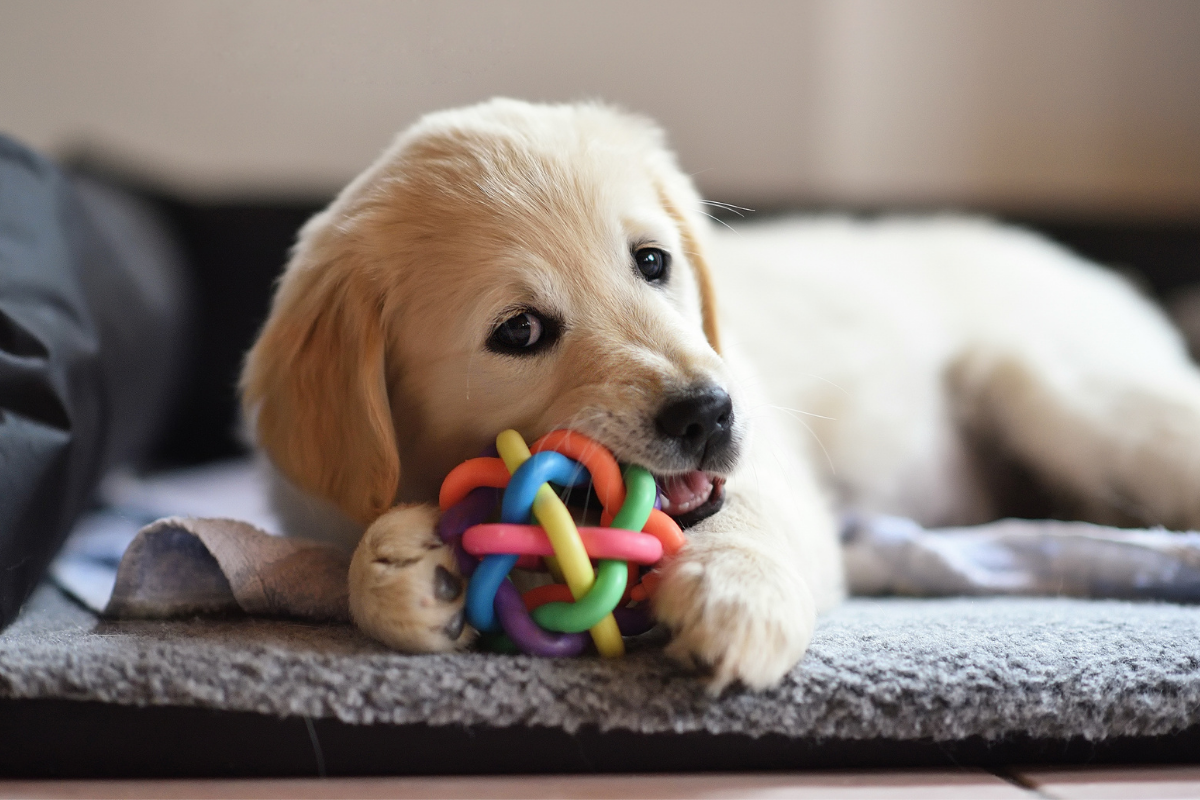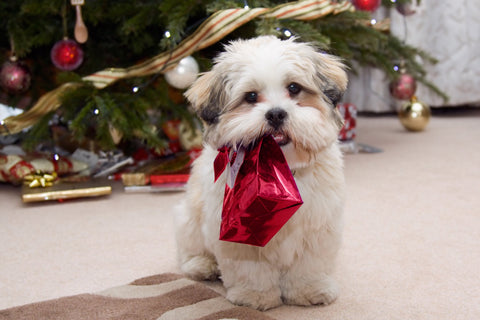You come home to a happy home, with a furbaby waggling their tail. You have the biggest smile on your face seeing them, but then it turns into a frown. You see your slippers in bits and pieces inside your house behind them. Does this situation sound familiar to you?
So, why do dogs chew on things? What causes your dog to chew? Is there any way you can possibly control your pet's chewing once it gets a bit uncontrollable? Worry not, we're here to help you manage your furbaby to leave your slippers, furniture, and carpets alone.
"Sometimes, your furbaby doesn't know that your favorite pair of shoes is different from her favorite chew toy."

Really, why do dogs chew?
For most pet parents, they think only puppies chew. But really, all dogs chew no matter their age because chewing is a natural dog behavior. However, you can prevent your dog’s chewing from being destructive. Dogs chew for certain reasons including:
- Separation anxiety. A number of dogs engage in chewing because of separation anxiety. Separation anxiety happens when a furbaby is left alone at home and become overwhelmed and anxious. If your dog is experiencing separation anxiety, it is a good idea to learn more about what you can do as a pet parent to help. Learn more about the causes and how to help here.
- Boredom. This is also one of the most common causes of why dogs chew. Chewing is your furbaby's outlet to oppose their boredom. If you notice your dog chewing a lot, it can be to show you that they are bored.
- Teething. Puppies chew to help relieve the pain of teething. According to Holista Pet, teething is painful for puppies. Chewing helps relieve some of the pressure they feel in their mouths.
- Curiosity. Dogs are curious creatures and they love to try everything out! They explore the world through their mouths. So, new smells, new tastes, and new experiences (for them) are just so hard to resist! Dogs chew out of curiosity because they probably love the smell or the taste of something.
- Relaxation. Some dogs chew because it helps them to calm themselves down.

How to tell your dog not to chew inappropriate objects
Why do dogs eat shoes? Your dog chewing on shoes, furniture, carpets, and even electrical wires at home can be frustrating... and dangerous! But your dog chews on all these inappropriate things because they don't know better. Sometimes, your furbaby doesn't know that your favorite pair of shoes is different from their favorite chew toy.
That is, unless you teach them otherwise.
Here are some ways on how you can manage your dog's chewing on inappropriate things:
- Have plenty of appropriate chew toys. One important thing you can do to minimize your furbaby's habit of chewing on inappropriate things is by providing them lots of dog toys. This is an easier way to teach your dog to chew on their toys instead of your shoes. Redirecting them to a toy, rather than attempting teach your dog not to chew at all (which can be quite impossible) helps teach them what is appropriate. We will get into more appropriate toys in the next section. Note: Take extra precautions on chew toys that easily get torn down or are easily broken.
- Invest in teething relief products. If your dog is chewing because they are teething, it is best to consult your veterinarian on what teething relief products you can use for your pup. These will help relieve gum pain and will reduce your dog's urge to chew on inappropriate things.
- Maintain supervision. Until your dog is chew-trained, you should not be allowing them to freely walk around the house without supervision. Letting them do so will only increase the chance of your pup to get into something! Checking up on your furbaby will allow you to catch them in the act! When you do, take action to replace the object with a toy then give positive reinforcement.
- Exercise daily. A bored dog will always find something to chew to express their frustrations. This is why exercise and daily socialization to other dogs and people is important to help keep them mentally stimulated. According to the American Kennel Club, a mentally stimulated dog is a happy dog.
- A Bad Taste in your Mouth. You can try putting things like Apple Cider Vinegar or citrus flavors on inappropriate things they always chew on. This will not harm your furbaby but it tastes awful to them, steering them away. Note: test this on a small part of any furniture you plan to use it on to ensure no discoloration occurs.
- Redirect, reward, reinforce. Punishing your dog every time you catch them chewing on inappropriate things will do no good and will only increase their anxiety and stress. Instead of shouting at them, tell them a command, like “leave it”, and redirect them to their chew. As soon as your furbaby leads themselves to their chew, reward them. Rewards will encourage them to chew on their chews instead of other things in your house. If they continue their bad chewing habits, go back to the beginning. Soon, it will all pay off.
Encouraging appropriate chewing
Appropriate chewing means your furbaby is chewing on something safe and healthy, not just providing them any chews for the sake of not chewing on inappropriate things. Choosing the right chews for your furbaby will greatly depend on their chew personality, chew size, longevity, safety, and nutritional value. And luckily, Pet Parents® offers chews that have all of that - Gnawtlers®.
Gnawtlers® are naturally shed, grade A elk and deer antlers chosen very carefully according to density, weight, color, and shape. These chews are absolutely safe and suitable for your furbaby, whatever their chew personality may be.
- It does not break and splinter easily, like most other chews available
- Long-lasting; gives your furbaby longer chewing experiences and saving you money as it can last for months
- Has no artificial flavoring and fragrance
- Contains no artificial ingredients like dyes
- Has great nutritional value; has phosphorus, calcium, and zinc to provide nutritional value and provide dental benefits like preventing bad breath and averting periodontal diseases.
Gnawtlers® also varies in hardness:
- Whole Elk (softer) - typically for average chewers - for aggressive chewers they don't last as long because they are softer
- Split Elk (split so the bone marrow is exposed) - best for senior dogs & puppies who have sensitive teeth
- Whole Deer (harder) - best for aggressive chewers because of being harder & doesn't gnaw down as fast
Why do dogs chew inappropriate things? It comes down to they don't know otherwise or they are so smart and are curious! It is our responsibility as pet parents to teach them how, why, and to redirect & reinforce them to become better dogs. It will not only help alleviate stress for you, but it will help your pup live a happier and healthier life.

"Choosing the right chews for your furbaby will greatly depend on his chew personality, chew size, longevity, safety, and nutritional value. And luckily, we have chews that have all of that - Gnawtlers®."
Why do dogs chew? It comes down to either they don't know otherwise or they are smart and curious! It is our responsibility as pet parents to teach them what they can chew and what not to. Through redirection & reinforcement, you can help them to become better behaved dogs. It will not only help alleviate stress for you, but it will help your pup live a happier and healthier life.









